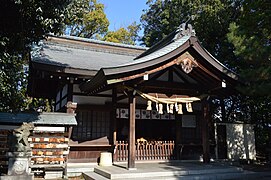Tagata Shrine
| Tagata Shrine | |
|---|---|
 | |
| Religion | |
| Affiliation | Shinto |
| Deity | Mitoshi (御歳神, Mitoshi-no-kami) Tamahime (玉姫命, Tamahime-no-mikoto) |
Tagata Shrine (田縣神社) is a small shrine located in Komaki City, Aichi Prefecture, Japan, near Nagoya Airfield.[1]: 6
Tagata Shrine is famous for its Harvest Festival Hōnensai, a fertility festival that some foreign tourists have dubbed "penis festival", which is held annually on March 15.[2][3] The festival has received large amounts of attention.[2]
It is near Ōagata Shrine which has a similar yonic festival the Sunday before this festival.[4][1]: 6
History
[edit]The exact year of foundation for Tagata Shrine is unknown, but it is believed to be over 1500 years old. It is known for combining beliefs related to fertility and agriculture.[1]: 6
It is listed as a Myojin Taisha in the Engishiki Jinmyocho.
Harvest festival
[edit]| Hōnensai | |
|---|---|
 Hōnensai at Tagata Shrine in Komaki | |
| Observed by | Japan |
| Type | Religious |
| Significance | Celebrates the blessings of a bountiful harvest and all manner of prosperity and fertility |
| Date | 15 March |
| Next time | 15 March 2025 |

Harvest Festival (豊年祭, Hōnensai) is a fertility festival celebrated every year on March 15 at the shrine.[2][3] Hōnen means prosperous year in Japanese, implying a rich harvest, while a matsuri is a festival. The Hōnen festival and ceremony celebrate the blessings of a bountiful harvest and all manner of prosperity and fertility.

The venerated Shinto deities are Mitoshi (御歳神, Mitoshi-no-kami) and female deity Tamahime (玉姫命, Tamahime-no-mikoto). Mitoshi is the son of the Shinto male deity Toshigami (年神) or known by local as Ōtoshi (大歳神, Ōtoshi-no-kami) and grandson of the Shinto deity Susanoo. Tamahime is a princess and the daughter of Ō'arata (大荒田命, Ō'arata-no-Mikoto), the matriarch of Owari clan (尾張氏) of her husband Takeinadane (健稲種命, Take'inadane-no-mikoto) who were blessed with two sons and four daughters. After her husband's death, she returned to his hometown Arata (situated close to Komaki), encouraged to cultivate with the help of her father Ō'arata, honor and achieved his achievements.[5]

In Inuyama City, there is another festival Sunday before at Ōagata Shrine (大縣神社). This festival includes floats shaped like a vulva, which complement the phallic-shaped mikoshi used in the festival.[4]
Gallery
[edit]-
torii
-
Okumiya
-
wish
-
treasure cave
-
object of worship
-
stone pillar
-
pastry
-
harvest festival
-
harvest festival
Access
[edit]- About 5 minutes on foot (about 200m) from Tagata-jinja-mae Station on the Meitetsu Komaki Line .
Related pages
[edit]References
[edit]- ^ a b c Picken, Stuart D. B. (2010-12-28). Historical Dictionary of Shinto (2 ed.). Scarecrow Press.
- ^ a b c https://www.e-periodica.ch/cntmng?pid=act-001%3A1959%3A16%3A%3A995
- ^ a b Knapp, Bettina L. (1997-01-01). Women in Myth. SUNY Press. ISBN 978-0-7914-3164-1.
- ^ a b D, John (2012-03-24). "Fertility festival (Oh-agata/ Oagata Jinja)". Green Shinto. Retrieved 2023-04-27.
- ^ "Small village gets real big at ancient celebration". Marine Corps Air Station Iwakuni, Japan. Retrieved 2023-11-18.
External links
[edit]English websites
[edit]- 田縣神社トップページ│Tagata jinja New Site (Japanese; official homepage of Tagata-Jinja)
- Yamasa Institute Tagata Jinja - Hounen Matsuri site (English) Archived 2006-04-14 at the Wayback Machine
- NameBright - Coming Soon
- Phallus photos and bits of info










